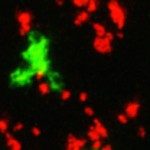Link to Pubmed [PMID] – 23112334
Science 2012 Oct;338(6106):532-6
Although regulatory T cells (T(regs)) are known to suppress self-reactive autoimmune responses, their role during T cell responses to nonself antigens is not well understood. We show that T(regs) play a critical role during the priming of immune responses in mice. T(reg) depletion induced the activation and expansion of a population of low-avidity CD8(+) T cells because of overproduction of CCL-3/4/5 chemokines, which stabilized the interactions between antigen-presenting dendritic cells and low-avidity T cells. In the absence of T(regs), the avidity of the primary immune response was impaired, which resulted in reduced memory to Listeria monocytogenes. These results suggest that T(regs) are important regulators of the homeostasis of CD8(+) T cell priming and play a critical role in the induction of high-avidity primary responses and effective memory.
